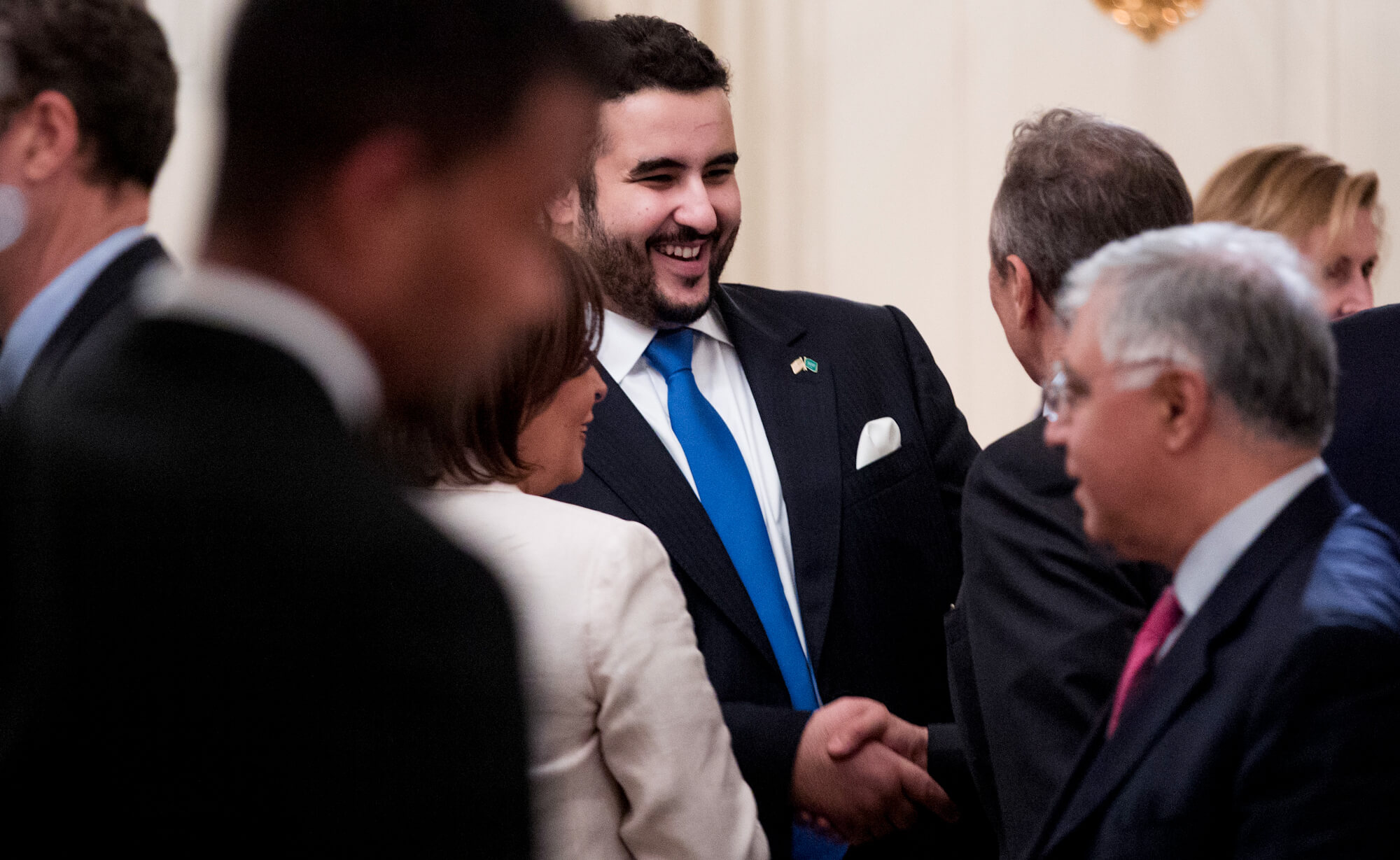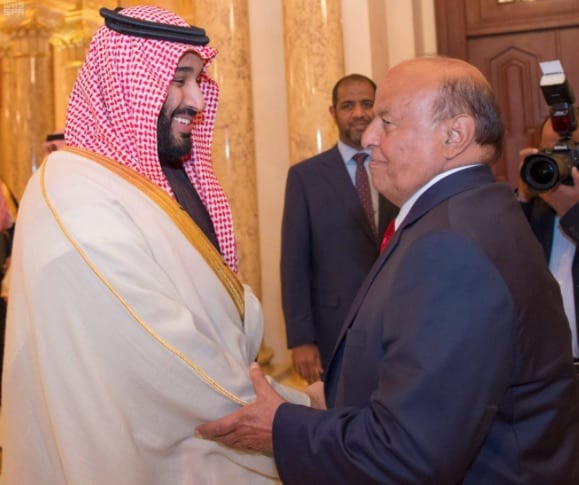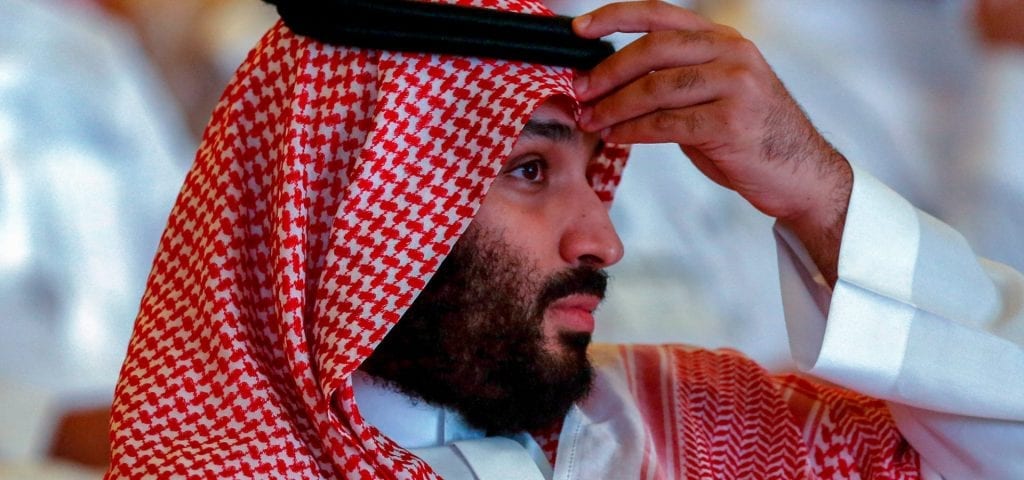Trouble in neoliberal paradise
In the six weeks before Khashoggi’s disappearance, MBS not only managed to anger the U.S. military-industrial complex but the world’s most powerful bankers.
RIYADH, SAUDI ARABIA — Amid a chorus of condemnation directed against his leadership following the slaying of controversial journalist Jamal Khashoggi, Saudi Crown Prince Mohammed bin Salman – popularly known by the moniker MBS – condemned Khashoggi’s murder in no uncertain terms on Wednesday, calling the deed a “heinous crime that cannot be justified” and promising “justice” for those who killed him. MBS’ statement came after dozens of media reports, the majority of which had cited anonymous sources from within the Turkish and U.S. governments, revealed the grisly details of the journalist’s final moments and the subsequent attempt by his killers to cover their tracks.
Yet, while MBS may expect the international calls for his ouster to lessen following his recent admission and apparent behind the scenes deal-making, he is likely mistaken. Indeed, much of the outrage directed at MBS for his alleged role in Khashoggi’s death has little to do with the murder itself, which is being used as a pretext to justify replacing MBS with a more “reliable” tyrant to serve as Saudi crown prince.
This is because the real reason the knives have come out for MBS is not a single extrajudicial killing – a practice the Saudis have long used with impunity – but instead the fact that, in the six weeks prior to Khashoggi’s sordid fate, MBS not only managed to anger the entire U.S. military-industrial complex, he also enraged the world’s most powerful financial institutions, including Goldman Sachs and CitiGroup.
In a recent report on the Khashoggi affair, MintPress detailed how MBS had endangered the $110 billion weapons deal with the United States that Trump has often touted as proof that he is creating jobs and is a proven “deal maker.” However, far from a signed contract, the “deal” was instead a collection of letters of interest and letters of intent. Over a year since the deal was first announced, it has since become clear that MBS no longer intends to purchase all $110 billion, as shown by his decision to let the deadline pass on the purchase of the $15 billion Lockheed Martin THAAD missile system. The Saudis let that deadline come and go on September 30, just two days before Khashoggi walked into the Saudi consulate in Istanbul and never came out.
However, it turns out that — a few weeks before the Lockheed deadline had come and gone — MBS had endangered another lucrative deal, one that was valued in the trillions and seems to have been a major factor in his rapid ascent to the powerful position of crown prince.
Who really crowned the prince?
Back in 2015, there were already concerns in international intelligence that an imminent power struggle in the Saudi royal family was brewing. Notably, concern within some intelligence communities regarding the likely rise of MBS was so high that Germany’s intelligence agency BND publicly released a memo slamming MBS as a destabilizing influence who was responsible for the new Saudi “impulsive policy of intervention.” It went on to warn that MBS, then head of the Saudi Defense Ministry and an economic council aimed at overhauling the country’s oil-dependent economy, was seeking to dramatically concentrate power in his hands. Doing so, the memo warned, “harbours a latent risk that in seeking to establish himself in the line of succession in his father’s lifetime, he may overreach.” The memo was right of course, but it largely fell on deaf ears.
Then, last June, MBS made his move and deposed his predecessor Mohammed bin Nayef after hours of interrogation, threats and alleged torture, becoming the new crown prince in the process. Bin Nayef – who has remained under house arrest for over two years — had been a close partner of the U.S. — particularly the CIA, which bestowed upon bin Nayef one of its most prestigious medals. As Federico Pieraccini recently noted at Strategic Culture, bin Nayef had long been the CIA’s “go-to man” in Saudi Arabia and had helped the CIA use the guise of “counterterrorism” to fund al Qaeda and other radical Wahhabi groups to wreak havoc on countries in the region, particularly Syria, that had become the targets of the American empire.
Normally, the ouster of a Washington-allied Crown Prince close to the CIA would have dramatically shaken the Washington establishment. However, there was little public complaint from the American political elite over MBS’ dramatic rise to power. Instead, the U.S. clearly supported MBS’ new power, as demonstrated by the fact that President Donald Trump called MBS to “congratulate him on his recent elevation” the day he became Crown Prince, and the two subsequently pledged “close cooperation” in security and economics. Some analysts have since speculated that the U.S. government had actually helped facilitate MBS’ palace coup given that, just a few months prior, MBS – not bin Nayef — had met with Trump in Washington.
Others have suggested that powerful Western financial interests were behind MBS’ rise, given that the king’s son had announced his willingness to sell Saudi state assets to the highest bidder in a January 2016 interview with the Rothschild-owned Economist a little more than six months before he became crown prince. The interview certainly made it clear to the international elite that MBS was willing to support neoliberal reforms that had been rejected by Saudi royals in the past. Indeed, wrapped within his economic reform program known as “Vision 2030,” MBS offered the Western elite something they had long coveted but had never been able to obtain. He agreed to privatize Saudi-state-held assets, including the biggest cash-cow of them all – Saudi Arabia’s state oil company, Aramco.
MBS – the “reformer” who wasn’t
[dropcap]T[/dropcap]hough the media has long spun Vision 2030 as MBS’ “ambitious” plan to wean the Saudi economy off its dependency on oil, the plan itself is actually a free-for-all for private interests and involves the neoliberalization of Saudi state-owned assets. Among its pillars are the opening of Saudi financial markets to Wall Street and the privatization of essentially everything in the Gulf Kingdom, including healthcare and, of course, Aramco.
The fact that Vision 2030 was essentially a neoliberal wish-list should not come as a big surprise, however, given that it was based off a 2015 report authored by the McKinsey Global Institute, the research arm of the U.S.-based consulting firm McKinsey & Company — the “most prestigious” consulting firm in the world, known for its “neoliberal solutions to real-world problems”.
According to a report published last year in Foreign Policy, “McKinsey has cultivated a generation of young Arab princelings enamored with Western-style economic reforms, and with thoroughly mixed results.” However, this was especially true of Saudi Arabia, where MBS cultivated even closer ties with the firm and has relied on it, not just for the blueprint of Vision 2030 but also for choosing his new cabinet following his rise to the position of Crown Prince as well as a list of prominent Saudi dissidents who were later repressed.
In addition, McKinsey’s influence goes far beyond the firm itself, as its past employees or “alumni” go on to serve powerful positions in the corporate world or in government. Though the extent of McKinsey’s influence in helping MBS rise to become crown prince is unknown, it is certainly a possibility that the firm had used its influence to “grease the wheels” in order to give near-ultimate authority to one of these “young Arab princelings,” who would embrace neoliberal reforms that older generations would not.

Saudi Crown Prince Mohammed bin Salman arrives for a press conference in Riyadh, on April 25, 2016. Photo | SPA
[dropcap]V[/dropcap]ision 2030 certainly seemed to win MBS the affection of the international elite across the board — and it seemed that the new Crown Prince enjoyed the limelight, at least for a while. However, it seems reality began to set in for MBS, and he has consequently spent the past several months looking for a way to indefinitely delay the plan’s implementation.
This first became clear earlier this year following speculation in July that the Saudi Aramco Initial Public Offering (IPO) — i.e., the beginning of the partial privatization of the Saudi state oil company through the selling of shares — may not materialize after all. Then, it was announced in late August that the entire IPO would be shelved. Bloomberg called this “the most significant reversal in Prince Mohammed’s plans” and added:
Rather than marking a watershed in one of the most ambitious economic projects in history, it [the shelving of the Aramco IPO] now highlights the unpredictability of the country under a young leader who has centralized political power in his own hands since becoming de facto ruler a little over a year ago.”
As a result, what would have been the biggest IPO in history was called off overnight. The move was surely a disappointment to Trump, who had personally lobbied MBS to list Aramco on the New York Stock Exchange (NYSE), as doing so would have awarded the NYSE with the largest stock market listing ever. However, it was a much, much bigger disappointment for the behemoth financial institutions that had worked frantically to secure their roles in the deal — Bank of America, Goldman Sachs, and CitiGroup, among others — as the shelving of the IPO meant that all their work on the deal would now go without compensation, as banks are typically only paid when such deals are finalized. In other words, MBS’ decision to put the IPO indefinitely on hold meant that the most powerful, politically-connected banks had essentially been forced to work for free.
It seems that MBS sensed the animosity he had caused in some of the world’s most powerful financial institutions, given that, just a few weeks later, he offered Goldman Sachs, Bank of America and CitiGroup a prominent role in Aramco’s new plans to buy a majority stake in the Saudi petrochemical company Saudi Basic Industries Corp (Sabic). As part of that deal, Aramco has considered selling bonds in what could become the largest sale of corporate debt ever. However that Aramco-Sabic deal, valued at $70 billion, is still significantly less than the $100 billion that the Aramco IPO was set to generate.
More importantly, the deal shows that MBS got cold feet in his privatization plans, as having a state-owned company (Aramco) buy a majority stake in a private Saudi company (Sabic) is the complete opposite of what MBS had promised in the months prior to his rise to become Saudi crown prince. Indeed, as Bloomberg noted at the time:
The [Aramco] bond sale would give Saudi Arabia some of the financial payoff of an IPO, though without having to share ownership with international investors — or revealing information the kingdom would rather keep private.”
Thus, it seems that it was the privatization of Aramco that had MBS spooked.
Far beyond the cancellation of the IPO itself — MBS has endangered other parts of the plan that these powerful financial interests had been counting on for well over a year. That includes Vision 2030’s plan to increase the Saudi Public Investment Fund (PIF) — which is managed by a group of HSBC and Bank of America directors and a CitiGroup investment banking alumnus — from its current $230 billion in assets to a massive $2 trillion. The dramatic increase in the fund’s size would make the PIF the largest sovereign wealth fund in the world. Without that injection of cash into the PIF from the Aramco IPO, media reports have warned of a “ripple effect” on the U.S. economy, including massive U.S. tech companies like Uber, given that the PIF has invested heavily in such companies.
Evidence has since emerged that MBS knows that these powerful banks are still angry despite his efforts to placate them. On October 5, just a few days after Khashoggi’s murder, MBS promised a new Aramco IPO within a few years, this time valued at $2 trillion. However, media reports on that announcement made it clear that Goldman Sachs, CitiGroup and the like weren’t convinced.
Indeed, with the entire privatization effort now in doubt, so too is the estimated $6 trillion in direct investments from powerful interests that had been planned to fund the privatization schemes that comprise the entirety of Vision 2030. That figure could certainly explain why so much pressure has been levied against MBS as of late over Khashoggi. Indeed, given that the Saudis had butchered another dissident writer in 1979 in their Lebanese consulate without the same outrage that has resulted from Khashoggi’s murder, it is safe to say that the establishment’s outrage over this latest extrajudicial killing is motivated less by “human rights” than by trillions of dollars of capital.
Trouble in neoliberal paradise
[dropcap]W[/dropcap]hile it is impossible to know MBS’ exact reason for getting cold feet in his once-ambitious plans to privatize the kingdom, we can guess. Indeed, there is a reason that MBS’ elders in the Saudi Royal family have long rejected neoliberal reforms and the mass privatization of their economy.
A 2016 report from Foreign Policy succinctly states why past Saudi Royals have avoided “free-market reforms” as the older generations of the House of Saud “understand the fragility of a monarchy whose brittle pillars rest on the quiescence of conservative clerics and a merchant class hostile to the free-market reforms that will undercut their privileges.” However, far more Saudis than just the “merchant class” have grown accustomed to the largesse of the Saudi state, as the majority of Saudi citizens benefit from Saudi state spending in the form of fuel subsidies, loans, free land, and public-sector jobs, among other boons. Indeed, half of the entire Saudi population is currently on welfare — welfare that depends on the wealth of the Saudi state and its oil revenue — while two-thirds of Saudis work in the public sector.
Of course, sharing oil profits with robber barons — as would have been the case in the partial privatization of Saudi Aramco — would reduce the amount of money the Saudi government dedicates annually to welfare programs and public-sector jobs to a significant degree. Notably, Vision 2030 also included “austerity programs” as part of its implementation, including tax increases and a significant reduction in the fuel subsidies given to ordinary Saudis.
However, less than a week after a handful of those austerity measures were implemented earlier this year, the Saudi government quickly eased them by increasing state-job salaries and launching a new economic stimulus program, after a “very negative” public response. Despite the government’s efforts to assuage the anger that austerity had caused, it was not enough and the outcry continued, forcing the Saudi government to fire the country’s water minister to absorb some of the outrage. The fierce public response seems to have given MBS his first real inkling that his “ambitious reforms” to privatize Saudi Arabia would not be so easy to implement, no matter how hard he had worked to crush dissent.
Another indication of why MBS backed out of privatization plans can be seen in what happened to other countries when their young princes, championed as “ambitious reformers,” had drunk the “McKinsey Kool-Aid.” As Salem Saif wrote at Jacobin, many of the Arab countries that had previously followed McKinsey-drafted plans for neoliberalization subsequently “became epicenters of the Arab Spring. Bahrain, Egypt, Libya, Yemen — each was convulsed by demonstrations, often animated by economic grievances.”
In contrast, Saudi Arabia, with its state-owned and state-managed assets, had remained largely immune to these economically-spurred uprisings throughout the Middle East.
However, earlier this year, MBS learned the hard way from the hostile reception to his privatization rollout that being the West’s neoliberal darling comes at a high price, one that could imperil not just his position as Crown Prince but the entire Saudi government.
The search begins for a new prince who will play along
[dropcap]A[/dropcap]s a consequence of the Khashoggi incident, there have been several reports from prominent publications claiming that efforts are now underway to replace MBS as crown prince. One such report in France’s Le Figaro has stated that MBS is set to be “gradually” replaced by his even younger brother Khalid bin Salman, who has most recently served as the Saudi Ambassador to Washington. This choice is significant, as it shows that the powers-that-be are seeking to replace MBS with another McKinsey-bent “young Arab princeling” instead of the former Crown Prince Mohammed bin Nayef or another elder of the House of Saud who would oppose the privatization that MBS had promised but failed to deliver.

Prince Khalid bin Salman attends a White House dinner, June 6, 2018, in Washington. Andrew Harnik | AP
In a Washington Post op-ed, Khalid bin Salman’s support for the neoliberal Vision 2030 plan is clear, as he called it “a comprehensive plan for economic diversification as well as social and cultural reform” and echoed his older brother in stating that “our old course was not sustainable.” Beyond his stated views in support of current Saudi policy, including the genocidal war the Saudis are waging in Yemen, not much else is known about Khalid, who has little political experience given his young age and his time spent as a fighter pilot in the Royal Saudi Air Force. Yet, in his capacity as Saudi ambassador, Khalid bin Salman has met with powerful Congressmen from both parties, as well as Lockheed Martin executives, cultivating personal ties in the process.
However, the Khashoggi incident has brought new scrutiny to Khalid bin Salman, given that he had personally met Khashoggi in the Saudi Embassy in Washington in early 2018, around the same time that Khashoggi was creating Democracy for the Arab World Now (DAWN), his new “democracy promotion” group targeting the kingdom. According to friends of Khashoggi who spoke to NBC News, the meeting was casual and friendly and lasted about 30 minutes. The topics of the discussion of the meeting are still unknown.
Will MBS be replaced? It certainly remains to be seen, as strong public pressure and political threats may yet guide the crown prince back to the neoliberal fold. Yet, what is clear is that MBS’ rise to power was backed by the international elite and the Trump administration based on the promise of these neoliberal reforms and the mass sale of U.S. weapons to Saudi Arabia. However, in the months before Khashoggi’s disappearance, MBS gravely endangered both of these deals, angering those that had backed his consolidation of power. Such a cadre of powerful interests will not prove easy to placate.
While it may certainly seem ironic and perhaps amusing to some that a tyrant like MBS has come under such strong pressure from the international elite, there is reason for concern. Indeed, if Vision 2030 is fully implemented — whether by MBS or his successor — forcing neoliberalism on the Saudi population is likely to make the country very unstable, as nearly occurred when MBS tried to implement it early this year.
The intense pressure from global power players may cause MBS to value his staying in power above all else, potentially prompting him to enact domestically unpopular economic “reforms” despite the outcry that will inevitably result. If MBS’ past decisions are any indication, he would use force to crush any outcry. If this takes place, we can expect many more to suffer a fate similar to Khashoggi’s, as Saudi Arabia would become an even more inhospitable place for dissidents.
Top Photo | Saudi Crown Prince, Mohammed bin Salman, attends the Future Investment Initiative conference, in Riyadh, Saudi Arabia, Oct. 23, 2018. The high-profile economic forum in Saudi Arabia is the kingdom’s first major event on the world stage since the killing of writer Jamal Khashoggi at the Saudi Consulate in Istanbul earlier this month. Amr Nabil | AP





















